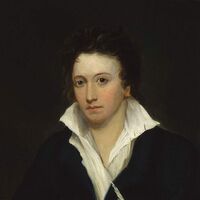The Devil’s Walk. a Ballad
I.
Once, early in the morning, Beelzebub arose,
With care his sweet person adorning,
He put on his Sunday clothes.
II.
He drew on a boot to hide his hoof,
He drew on a glove to hide his claw,
His horns were concealed by a Bras Chapeau,
And the Devil went forth as natty a Beau
As Bond-street ever saw.
III.
He sate him down, in London town,
Before earth’s morning ray;
With a favourite imp he began to chat,
On religion, and scandal, this and that,
Until the dawn of day.
IV.
And then to St. James’s Court he went,
And St. Paul’s Church he took on his way;
He was mighty thick with every Saint,
Though they were formal and he was gay.
V.
The Devil was an agriculturist,
And as bad weeds quickly grow,
In looking over his farm, I wist,
He wouldn’t find cause for woe.
VI.
He peeped in each hole, to each chamber stole,
His promising live-stock to view;
Grinning applause, he just showed them his claws,
And they shrunk with affright from his ugly sight,
Whose work they delighted to do.
VII.
Satan poked his red nose into crannies so small
One would think that the innocents fair,
Poor lambkins! were just doing nothing at all
But settling some dress or arranging some ball,
But the Devil saw deeper there.
VIII.
A Priest, at whose elbow the Devil during prayer
Sate familiarly, side by side,
Declared that, if the Tempter were there,
His presence he would not abide.
Ah! ah! thought Old Nick, that’s a very stale trick,
For without the Devil, O favourite of Evil,
In your carriage you would not ride.
IX.
Satan next saw a brainless King,
Whose house was as hot as his own;
Many Imps in attendance were there on the wing,
They flapped the pennon and twisted the sting,
Close by the very Throne.
X.
Ah! ah! thought Satan, the pasture is good,
My Cattle will here thrive better than others;
They dine on news of human blood,
They sup on the groans of the dying and dead,
And supperless never will go to bed;
Which will make them fat as their brothers.
XI.
Fat as the Fiends that feed on blood,
Fresh and warm from the fields of Spain,
Where Ruin ploughs her gory way,
Where the shoots of earth are nipped in the bud,
Where Hell is the Victor’s prey,
Its glory the meed of the slain.
XII.
Fat—as the Death-birds on Erin’s shore,
That glutted themselves in her dearest gore,
And flitted round Castlereagh,
When they snatched the Patriot’s heart, that HIS grasp
Had torn from its widow’s maniac clasp,
—And fled at the dawn of day.
XIII.
Fat—as the Reptiles of the tomb,
That riot in corruption’s spoil,
That fret their little hour in gloom,
And creep, and live the while.
XIV.
Fat as that Prince’s maudlin brain,
Which, addled by some gilded toy,
Tired, gives his sweetmeat, and again
Cries for it, like a humoured boy.
XV.
For he is fat,—his waistcoat gay,
When strained upon a levee day,
Scarce meets across his princely paunch;
And pantaloons are like half-moons
Upon each brawny haunch.
XVI.
How vast his stock of calf! when plenty
Had filled his empty head and heart,
Enough to satiate foplings twenty,
Could make his pantaloon seams start.
XVII.
The Devil (who sometimes is called Nature),
For men of power provides thus well,
Whilst every change and every feature,
Their great original can tell.
XVIII.
Satan saw a lawyer a viper slay,
That crawled up the leg of his table,
It reminded him most marvellously
Of the story of Cain and Abel.
IXX.
The wealthy yeoman, as he wanders
His fertile fields among,
And on his thriving cattle ponders,
Counts his sure gains, and hums a song;
Thus did the Devil, through earth walking,
Hum low a hellish song.
XX.
For they thrive well whose garb of gore
Is Satan’s choicest livery,
And they thrive well who from the poor
Have snatched the bread of penury,
And heap the houseless wanderer’s store
On the rank pile of luxury.
XXI.
The Bishops thrive, though they are big;
The Lawyers thrive, though they are thin;
For every gown, and every wig,
Hides the safe thrift of Hell within.
XXII.
Thus pigs were never counted clean,
Although they dine on finest corn;
And cormorants are sin-like lean,
Although they eat from night to morn.
XXIII.
Oh! why is the Father of Hell in such glee,
As he grins from ear to ear?
Why does he doff his clothes joyfully,
As he skips, and prances, and flaps his wing,
As he sidles, leers, and twirls his sting,
And dares, as he is, to appear?
XXIV.
A statesman passed—alone to him,
The Devil dare his whole shape uncover,
To show each feature, every limb,
Secure of an unchanging lover.
XXV.
At this known sign, a welcome sight,
The watchful demons sought their King,
And every Fiend of the Stygian night,
Was in an instant on the wing.
XXVI.
Pale Loyalty, his guilt-steeled brow,
With wreaths of gory laurel crowned:
The hell-hounds, Murder, Want and Woe,
Forever hungering, flocked around;
From Spain had Satan sought their food,
’Twas human woe and human blood!
XXVII.
Hark! the earthquake’s crash I hear,—
Kings turn pale, and Conquerors start,
Ruffians tremble in their fear,
For their Satan doth depart.
XXVIII.
This day Fiends give to revelry
To celebrate their King’s return,
And with delight its Sire to see
Hell’s adamantine limits burn.
XXIX.
But were the Devil’s sight as keen
As Reason’s penetrating eye,
His sulphurous Majesty I ween,
Would find but little cause for joy.
XXX.
For the sons of Reason see
That, ere fate consume the Pole,
The false Tyrant’s cheek shall be
Bloodless as his coward soul.

